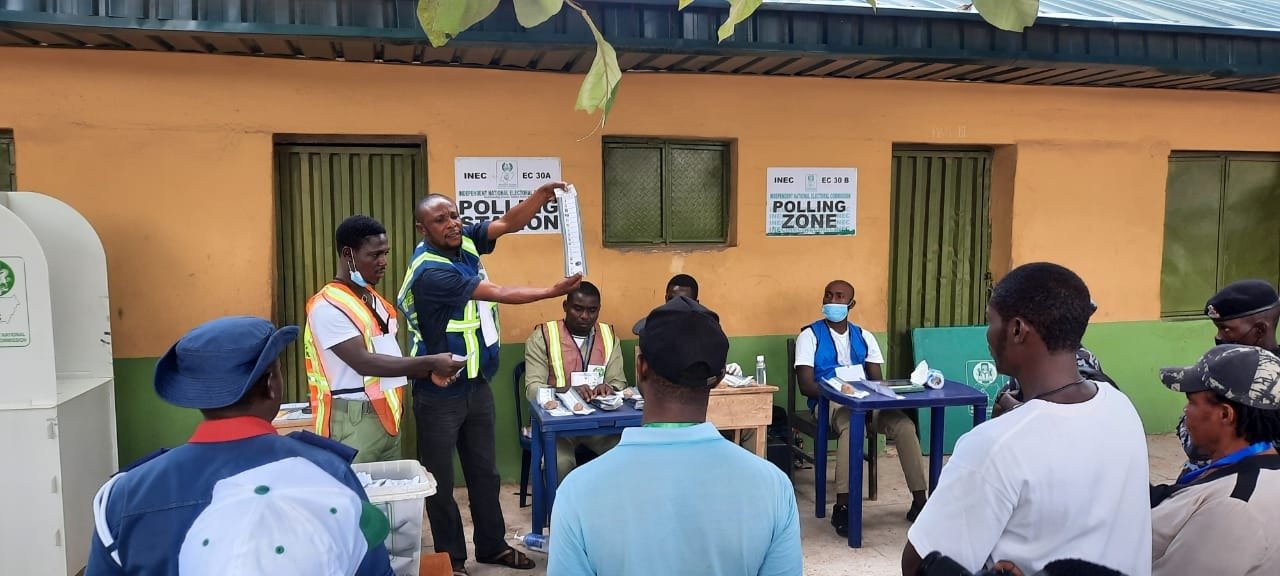Last Saturday, voters in Ekiti State turned out to vote in the state’s governorship elections featuring candidates from various political parties.
It was a contest in which the incumbent Governor, Kayode Fayemi was not on the ballot having taken part and won the seat twice. Thus, the election offered an opportunity for new candidates to test their popularity and acceptance before the Ekiti electorate as the Fayemi era winds down and a new dispensation unfolds in the state.
- Congressmen won’t allow Pinick’s normalisation plot – Mouktar
- 2023: Crisis in Kano PDP threatens Atiku’s chances
The election was widely reported as being peaceful and devoid of the rancour, which had characterised previous elections in the state.
The Centre for Democracy and Development (CDD), which monitored the Ekiti election reported that its data indicated that 86 per cent of electoral officials from the Independent National Electoral Commission arrived at their polling units early enough, which is 8.30am. Professor Adele Jinadu, who is the Head of CDD’s Election Analysis Centre in his preliminary report stated that CDD field observers found “That the atmosphere in which the election was conducted was generally peaceful.’’.
However, the Ekiti State governorship candidate of the Social Democratic Party, Chief Segun Oni, and his Action Democratic Party counterpart, Mrs Kemi Elebute-Halle, have rejected the results of the election, saying the outcome will be challenged at the tribunal. Elebute-Halle, particularly said the victory of Biodun Oyebanji in the election was “Tainted with vote buying and corruption”.
In many ways, the Ekiti election was a litmus test for the new electoral law recently passed by the National Assembly and assented to by President Muhammadu Buhari. The law contains radical new provisions, especially in the area of electronic voting and transmission of results.
Senators Opeyemi Bamidele and Abiodun Olujimi representing Ekiti central and south respectively lauded the newly introduced Bimodal Voters Authentication System (BVAS), which encompasses all the aspects voter accreditation and authentication that was deployed smoothly during the Ekiti elections. In Senator Bamidele’s observation, “With BVAS there is no fear of anybody tampering with the accreditation process and that is the beauty of democracy’’. This is, therefore, an improvement in the BVAS, which malfunctioned during the Anambra State governorship election and we urge INEC to continue to improve on it as we approach the 2023 general elections.
One other area in which the Ekiti elections deserve our commendation was in the transmission of the results from the polling units to the collation centres. From our experiences in the conduct of elections in the country, transmission of results to collation centres has always been the trickiest part of the electoral process where all kinds of untoward activities from thumb printing to ballot stuffing and declaration of bogus results occur to put question marks on the outcome of elections. Happily, with the speedy transmission of results from the polling units to the collation centres, these perennial negative practices that characterise our elections were drastically reduced, enabling the declaration of results in record time in the Ekiti elections.
While our commendation goes to the agencies for working to deliver the Ekiti elections to the general satisfaction of Nigerians, we must point out some negative developments which occurred in the course of the elections.
The first has to do with the low turnout of voters during the elections. Of the 988, 923 registered voters in Ekiti only 360,753 came out to vote in the governorship elections representing about 36 per cent of the total voting strength of the state. This is hardly encouraging and we urge INEC, the National Orientation Agency, the federal and state ministries of information as well as other responsible institutions of government to redouble their efforts towards closing the gap in mobilising and sensitising the general populace towards voting massively at elections. Nigerians must be made to understand that voting during elections is not just a civic responsibility but a moral one as well, as it is the most important way in which they can deliver their verdict on who should lead them or not.
The second observable occurrence at the Ekiti election was the incidence of vote buying and selling at the polling units. In a number of cases, as reported, this was done glaringly and the monies offered ranged from N5000 to N15000. Needless to say, this is a criminal act, which goes against the provisions of the law. And it is unfortunate that virtually all the political parties were involved in this unwholesome practice as widely reported. The parties should be called to order and in subsequent elections, drastic steps must be taken to ensure this does not repeat itself. The electorate must also understand that they bear the direct consequences of their actions.
While congratulating Biodun Oyebanji of the APC for emerging victorious at the Ekiti polls, we urge him to see his victory as a challenge to run an inclusive government in which all the shades of Ekiti society have a sense of belonging.

 Join Daily Trust WhatsApp Community For Quick Access To News and Happenings Around You.
Join Daily Trust WhatsApp Community For Quick Access To News and Happenings Around You.


